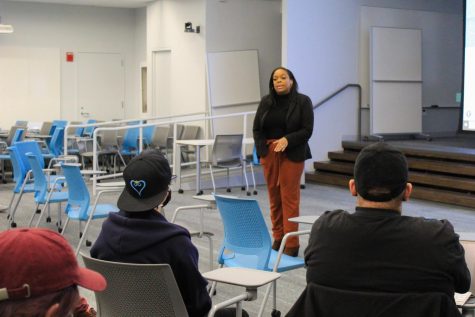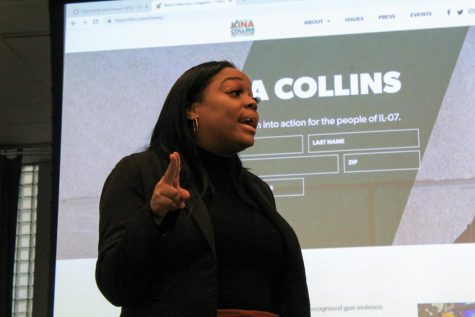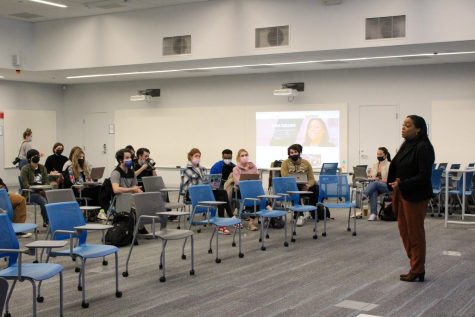Illinois congressional candidate Kina Collins visits campus, shares what it means to be a community expert
April 20, 2022

Kina Collins, a Democratic congressional candidate for the 7th Congressional District in Illinois, defines violence not only as a punch or a gunshot, but also as the closing of public schools, food deserts in communities, police brutality and a lack of access to clean drinking water.
Collins grew up in the Austin neighborhood on the West Side and said she experienced the “triumph and tragedy” of this fact.
“When I was in grade school, I actually witnessed a murder in my community. I knew the shooter, and I knew the victim, and it changed the entire trajectory of my life because that is the story of so many young people still to this day in the United States of America,” Collins said. “And what I knew about those two young men was that the bullet was flying in the air long before either one of them got into an altercation, or anybody pulled the trigger.”
Collins was invited to speak to Columbia’s “Innovation and Impact: Defending Democracy” students at 618 S. Michigan Ave. on April 11. Students had the opportunity to ask Collins questions about what she plans to do if she is elected and how she became involved in politics.
The class teaches students about voter suppression and voting rights and is a new course created by Sharon Bloyd-Peshkin, professor in the Communication Department and creator of Columbia Votes. Bloyd-Peshkin met Collins at a meet-and-greet a few years ago.
Bloyd-Peshkin said she wanted students to have the chance to meet a political candidate and see them as real people, learn how they communicate their campaign and combat the idea that all political candidates are the same, which tends to repel voters.
Raised by working-class parents and members of Chicago labor unions in a divested neighborhood, Collins said she did not always have faith in government but her parents affirmed to her at a young age that she can ignite change.
When she was a student at Louisiana State University in 2015, Collins was involved in the activism and organizing around Laquan McDonald’s murder by a Chicago police officer.
“On the front lines of that protest, I realized that the power just wasn’t right there in the protests, it was in the public policy rooms, people who are making decisions about what we cared about who didn’t really come from our communities, and didn’t really care about our humanity,” Collins said.

The 7th District includes the South Loop, where Columbia is located, the West Side of Chicago, as well as some suburbs. Collins described it as a “microcosm of the U.S.” because it includes some of the wealthiest people and some of the most working-class people.
The current Illinois 7th District congressperson, Rep. Danny Davis, has held the seat since 1996. Collins lost against him in 2020, but is trying again. Democrat Denarvis Mendenhall is also running for the seat.
“I decided to run against Congress[person] Davis one, because we need to elect more women and more Black women into office, quite frankly,” Collins said. “I believe that in this district, which is a plurality African American district and a super-majority woman district, we need representative democracy.”
In response, Davis agreed “wholeheartedly” with Collins’ statement, and said he has helped elect many African American women over the years he has been in office.
“I certainly think that there should be more African American women elected to public office. I expect to keep helping them get elected,” Davis said.
Collins said if she is elected, she will prioritize COVID-19 relief and recovery and gun-violence prevention services. In the first 100 days, Collins strives to put together a healthcare and life expectancy task force to reduce the 30-year life expectancy gap between downtown and Englewood.
Her main areas of focus are achieving Medicare for All, housing and economic justice, the Green New Deal, justice reform and immigrant rights.
Collins said being a Black woman political candidate comes with challenges when “carving out a seat at the table,” like getting media attention and dealing with racist, sexist and ageist comments while keeping her mental health in check.
In 2017, Collins co-wrote the Illinois Council on Women and Girls Act. She visited 68 counties in the state and helped pass a law in 2018 that created a racially and gender diverse advisory council for the governor on issues affecting women and girls when former Republican Governor Bruce Rauner was in office.

She later held tenure as the chairperson of the Illinois Council on Women and Girls, sat on President Joe Biden’s transition team for gun-violence prevention, founded the Chicago Neighborhood Alliance, helped form the Brand New Council, and was a member of the Generation Progress #Fight4AFuture National Leadership Council.
Collins said 40% of her campaign is funded by people in the district and she is endorsed by local and national organizations such as the Sunrise Movement, Black Lives Matter Women of Faith, Justice Democrats and We Have The People PAC among others. Collins said her campaign is not funded by any corporate political action committees.
Bloyd-Peshkin said it is especially important for students to learn about candidates in local primary elections because they are sometimes overlooked.
“So many of the decisions that are most contentious right now, and really affecting people’s lives are happening at the local level, not at the national level,” Bloyd-Peshkin said. “To recognize that I think inexperienced voters probably think mostly about President, but so much of what affects your life every day plays out at the local level.”
Jude Ramirez, a junior communications major, said they had never met a political candidate before and sees Collins as someone they would want to represent the area they live in.
Ramirez especially liked Collins’ policy on climate change and gun violence prevention, because Collins said she supports the Second Amendment but is also advocating for gun reform.
”It’s interesting to watch somebody move into a district that was already solidly behind somebody, and try to persuade those voters or voters who hadn’t yet gotten on board with that candidate, that there was something new to vote for,” Bloyd-Peshkin said.
Bloyd-Peshkin said Columbia students have the power to decide the outcome of this election and wants students to be aware that they can still vote at their dorm address in June after they have moved out.
The primary election will take place on June 28 and students can contact Columbia Votes, the nonpartisan voter registration organization on campus, with questions or concerns on how to register and vote.







